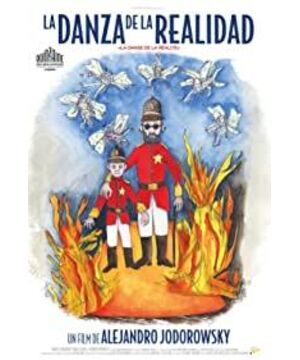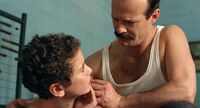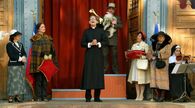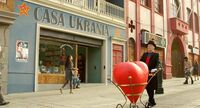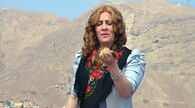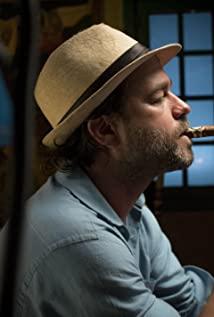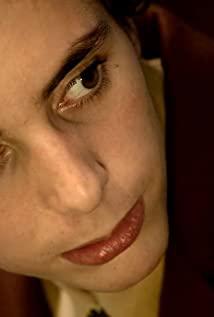Excerpted from the film review: The Two Monsters Continue The Frontier
Alessandro Jodorowsky has always been a heretical tree with crooked necks in the vast movie world. One film critic commented that Jordu was pertinent: wearing a blasphemous religious garb, he was using his lower body to make movies. In addition, Jordu only measures a film based on sheer artistic value, regardless of commercial considerations of input and output, and he is an uncompromising rock. Since his ambitious work [Dune] was rejected by all the management, every time a film is made, the management will always send a supervisor to follow him every day to prevent him from thinking wildly. In 1990, [Rainbow Thief] Jordu claimed to be pressed on the director's chair and shouted "Action" and "Cut", refusing to admit that it was his work. Unable to bear the anger and stopped playing, Jordu put down the guide tube and threw himself into the creation of comics.
Time flies, in 2011, the documentary [Jodorowsky's Dunes] invited him to appear on the scene, telling about the things about [Dune] in those years. During the filming, Jordu met Michelle Siddock, the producer of [Dune] together. I haven't seen each other for 35 years. The two chatted a lot this time, and they hit it off once again to prepare for the filming of [Dance Reality]. The impact of the release of [Dance Reality] on the film industry is tantamount to the impact Jordan played in baseball for two years and then picked up basketball again on the NBA. An old monster who has lived in seclusion for many years has once again come out of the mountains to harm the world, regardless of how much mana he still has in the past, he will go to the cinema to watch it because of Jodorowsky's famous name.
Pandora, who has opened memory,
must not judge [Dance Reality] by looking up at [Holy Mountain]. This time, instead of telling the absurd madman's dream-like journey of killing gods, Jordu turned the camera on himself, focusing on his childhood past. Terayama Shuji once borrowed the [Pastoral Festival of the Dead] and started a time-traveling discussion with his 12-year-old self about the trivial matters of the past. Everyone's memory is not complete, and everyone has private memories that they don't want to mention and don't want to talk to outsiders. The director can walk into the screen from behind the camera, which itself is a very courageous performance. Open the Pandora's Box of memories and follow Jordu to explore his fragmented childhood past.
Jodor grew up in the seaside town of Tocopia, Chile, which is just a seemingly peaceful town. There are many strange people in the circus, leaving a deep childhood shadow on the little Jordan. A group of miners who lost their arms and legs in the mine accident sang sad songs on the street, telling the injustice of fate and the ruthlessness of the mine owners. Childhood playmate Katolis wears Jordo's red rubber shoes and slips to his death on a reef beach. Because he is of Jewish origin, Jordu and his classmates can't play together. In the distance of the town, the black death crowd came over, the police isolated them on the beach, and the father drove a donkey cart to bring them water. Instead of being grateful, the hungry victims slaughtered the donkey and ate the meat of the donkey, shouting, "If you don't have enough food today, who cares about tomorrow!"... The scenes are presented through video, and Tocopia's bright and beautiful appearance Below, all that is left are the dark and gloomy childhood scars of Jordu.
The first half of the film mostly presents Tocopia's sad past from the main perspective of Jordo, while the second half mainly shows the strange journey of his father Jamme Jodorowsky. Rather than interpreting this history as a memoir of his father, it is better to refer to his father as a model of the Chilean people, revealing the grief of the country in Chile.
The military power of the Ibanez government in a repressive political environment controls students, controls unions, controls everything that can be controlled. Jamme Jodorowski, a radical activist, left Tocopia for the capital, Santiago, where he and fellow anarchists planned to assassinate the president. In a once-in-a-lifetime opportunity, the anarchists draw their guns at Ibanez, and Jammeh blocks in front of him and shouts: "This kind of person doesn't deserve to die so easily." The cruelest way to kill a person is to kill that person's favorite and leave him alive in agony. Jammeh was given the post of groom to take care of the president's favorite horse, and he developed a relationship with the horse during the nursing process. After the poisoning, the president came to the scene and wept bitterly, but Jammeh's trigger finger could not be bent, and his feet were nailed in place.
Jammeh walked into the street in a daze, and woke up in a nightmare. His fingers were still unable to bend, and his arms had been painted with colors—blood red on his left hand, blue white on his right, and a five-pointed star on it. Yes, it is the color of the Chilean flag. Going home is his only motivation, he is adopted by a kind church carpenter, and the hypocrisy of the pastor makes Jammeh, who has just converted to God, instantly die. As the rumbling tanks rolled over the street, Jammeh held off the Nazi intruders like magic. Afterwards, he was tortured in a secret room by the Shenxing Taibao, where he was abused and bullied. Jammeh survived and finally ushered in the rescue of the People's Liberation Front. With the help of young people, he returned to his hometown of Tocopia, and his hands were restored. After suffering and pain, the family finally left Tocopia by ferry.
This absurd journey has long deviated from the real historical background of the era in which Jordo lived. Jammeh is just a businessman in real life, not a radical. But the trauma caused by these military regimes, fascism, liberation movements, etc. to the Chilean people is real, as is the unbendable finger painted with the flag. Jodorowsky left his hometown of Tocopia at the age of 13, left Chile at the age of 18 for Paris, France, and did not return to his native land for a long time after that. The ethereal childhood memories have constructed a Tocopia that is not beautiful and full of sadness.
The madness of the cult is getting warmer and
the madness cannot survive, and Jordu has not changed. Even though he is over 80 years old, the absurd atmosphere of the cult has not diminished. The three treasures that Jordu used to - transvestites, homosexuality, and dwarfs are naturally not less. Due to the particularity of the subject matter, Jordu also tried many new elements.
The character creation is full of perverse drama. Jordu portrayed his father in the film to be extraordinarily arrogant and tough. As the head of the family, he has absolute authority. He admonished the young Jordu to be a strong man, tickling Xiao Jordu would not allow him to laugh, and slapping Xiao Jordu would not allow him to cry in pain, so as to gain his approval. My father was also a complete atheist, rejecting gods and all beliefs. He threw Jordu's three medals, the cross (Christ), the star and the moon (Muslim), and the hexagram (Jewish) into the toilet. Atheist beliefs determine his radical political philosophy, fierce opposition to the military regime Ibanez, urinating on a train full of radios, and attending parties seeking ways to change. He often taught little Jordu like this: God does not exist, people only rot after death, and father will never lie to you!
Compared to the father's extreme image of killing gods, the mother is a complete bearer of divinity. The mother used to be a singer in Ukraine. Jordu let her mother speak in the film, which is the form of singing. She taught Jordu with a completely different concept. The mother taught Xiao Zuo Du to carry the heart of longing, blend into the darkness of silence, and stay away from the world's rejection and injustice. A strong fatherhood corresponds to a tolerant motherhood, and the divine mother will often save the god-killing father in critical moments. His father was infected with the Black Death, and his mother sang hymns of spirit and flesh, and performed miracles to restore his father. When his father came home with the trauma of the whole Chilean people, it was his mother who enlightened him. The Stalin he admired and Ibanez hated was actually his own Jamme Jodorowsky. Shooting at the photo of himself, everything disintegrated, and the hand was restored. The divine mother finally tolerated and influenced the god-slaying father, which was also in line with Jordu's own values. He was a thoroughgoing cleric, a religious scholar familiar with various theories of Christianity, Judaism, Zen, Shaman, Tarot, etc.
Jordu has always been a natural performer, and it is not uncommon for him to walk in front of the camera for a show. [Dance Reality] Jodo starred in his true colors. Whenever little Jodo was hesitant, confused, and scared, the holy director would appear, supplemented by soothing music to recite poetic narration to appease his young self. Of course, it wasn't like this every time he performed. His father was going to assassinate the president, and he stretched out his hand in a gesture of asking for a gun. Jordu himself ran up and handed over the prop gun, which was hard to hide his old urchin. In addition to the ego represented by Jordo Jordi, who played the role of the id, the film also established the superego image of Freud's self-perception theory. The superego appears only once in the movie, and Jodorus calls him a saint, the god Jodorowsky, naked and painted with symbols of various religious schools. When Xiao Zuodu was watching the scenery by the sea, the god Zuodu appeared like a big god, taught Xiao Zuodu to recite the "Maha Prajna Paramita Heart Sutra", and gave him three religious badges (the three that his father still went into the toilet), Tell him the eternal philosophy of life in the universe... Little Jordan will definitely not understand the deep meaning of it, and who can really know himself in the subconscious?
Compared with several other CULT classics by Jordu, such as Fando and Liz, [Holy Mountain], this one does not lose its imaginative and bizarre brain holes, and even destroys religion and destroys beliefs. However, after 30 years of accumulation, the main tone of the film has transformed from fierceness to tranquility and poetry, and the complete narrative structure also reduces the difficulty of understanding the film as a whole. Terayama Shuji said in the [Pastoral Festival of the Dead], "If anyone is not freed from his own memory, then he is not a free person", and Jodo is undoubtedly one of the most free people. In an interview about the film, Jodorowsky appeared completely naked, with only hand-made mosaics, and said: "In my opinion there is no difference between poetry and film, just as I think there is no difference between a naked body and a naked soul. The difference. This is me, completely honest, naked body, naked soul, dancing with poetry and reality." May God give this old urchin a few more years to step on the footsteps of Jordu, co-author music, let Poetic dance movie.
Originally published in "Watching Movies Weekly" November 2014 with revisions
View more about The Dance of Reality reviews


